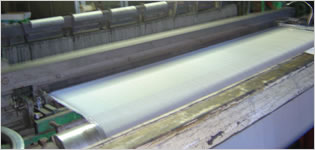Home > Products > Filter Wire Mesh
Steel Wire Filter Mesh: Durable, Corrosion-Resistant, Versatile
Filter wire mesh, crafted from steel wire, is distinguished by its exceptional durability and resistance to corrosion. It features uniform openings and is available in various weave patterns, including plain, twill, and Dutch, to cater to different filtration precision needs. Commonly used in the automotive, pharmaceutical, and food and beverage industries, this mesh excels in separating and purifying liquids and gases. Its benefits include high temperature resistance, easy cleaning, and the ability to withstand harsh environments, making it an ideal choice for critical filtration processes.
Materials
The choice of material for filter wire mesh is crucial as it determines the mesh's properties, including corrosion resistance, strength, and compatibility with the filtered substances.
Stainless Steel
- 304 Stainless Steel: Offers a good balance of corrosion resistance, strength, and cost-effectiveness. Widely used in various industries.
- 316 Stainless Steel: Provides superior corrosion resistance, especially in chloride environments. Ideal for applications involving seawater or harsh chemicals.
- 316L Stainless Steel: A low-carbon version of 316 stainless steel, offering improved weldability and resistance to intergranular corrosion.
- Other Stainless Steels: Alloys like 302, 309, and 310 are used for specific applications based on their unique properties.
Carbon Steel
- Low Carbon Steel: Economical choice for general-purpose filtration applications where corrosion resistance is not a primary concern.
- High Carbon Steel: Offers increased strength and hardness compared to low carbon steel.
Nickel Alloys
- Hastelloy: Excellent resistance to a wide range of corrosive environments, including acids and high temperatures.
- Monel: Combines high strength, corrosion resistance, and good ductility.
Other Metals
- Titanium: High strength-to-weight ratio, excellent corrosion resistance, and biocompatibility.
- Copper: Good thermal conductivity and electrical conductivity.
- Aluminum: Lightweight and corrosion-resistant.
Non-Metallic Materials
- Nylon: Flexible and resistant to many chemicals.
- Polyester: High strength and abrasion resistance.
- Polypropylene: Good chemical resistance and heat tolerance.
Wire Diameter
The wire diameter of filter wire mesh is typically expressed in millimeters (mm) or inches (in). Common wire diameters range from approximately 0.05mm to 2.0mm (0.002in to 0.08in). The choice of wire diameter depends on the desired mesh opening size, filtration accuracy, and application requirements.
Mesh Count
Mesh count, also known as mesh opening, refers to the number of openings per linear inch. Common mesh counts for filter wire mesh range from 4 mesh to 400 mesh. For example, a 100 mesh screen has 100 openings per linear inch.
Standard Shapes
Filter wire mesh is commonly produced in flat sheets, rolls, and cut-to-size panels. Custom shapes can also be fabricated to meet specific application needs.
Finishing
Filter wire mesh can be supplied in various finishes to suit different applications and environments. Common finishes include:
- Annealed: Soft and ductile for easy forming.
- Bright annealed: Annealed with a bright finish.
- Half-hard: Intermediate between annealed and full-hard for good balance of formability and strength.
- Full-hard: Hard and rigid for maximum strength and wear resistance.
- Electrolytic polishing: Smooth and corrosion-resistant finish.
- PVC coated: Corrosion protection and improved abrasion resistance.
Weave Types
- Plain weave: The most common weave type, characterized by a simple over-under pattern.
- Dutch weave: Offers increased strength and rigidity compared to plain weave.
- Twilled weave: Diagonal pattern provides additional strength and filtration efficiency.
- Reverse twill weave: Similar to twill weave but with the diagonal pattern in the opposite direction.
Construction Type
Filter wire mesh can be constructed in various ways, including:
- Woven wire mesh: Interlocking wires create a uniform mesh opening.
- Welded wire mesh: Wires are welded together at intersections for added strength.
- Electroformed mesh: Precision-engineered mesh with consistent aperture size.
Typical Standards
Filter wire mesh often conforms to industry standards such as ASTM, ISO, and DIN to ensure quality and consistency. Specific standards may vary depending on the application and end-use requirements.
Packaging
Filter wire mesh is typically packaged in rolls, sheets, or cut-to-size panels. Protective packaging is often used to prevent damage during transportation and storage.

| Specification List of Filter Mesh | |||||
| Model | Specification | Wire Diameter |
Materials | Area/ Weight |
Technical Notes |
| Standard | 40-100 Model 60-150 Model 140-40 Model 40-100 Model 40-100 Model 40-100 Model 40-100 Model |
0.1x0.4 0.1x0.4 0.1x0.4 0.27 0.1x0.4 0.25 0.2 |
stainless steel wire stainless steel wire stainless steel wire gal. iron wire copper wire polyamide fiber PVC fiber |
1/0.5 " " 1/0.7
|
1, For 40-100 model: 40 holes in 100% width 2, Metal filter mesh can be processed into weaves type |
| High Efficience Model | 60-100 Model 80-100 Model 90-150 Model 200-400 Model 60-100 Model 80-100 Model |
¢.012 0.1x0.3 0.1x0.3 0.1x0.3 0.1x0.3 ¢0.1-0.15 0.1-0.15 |
stainless steel wire stainless steel wire stainless steel wire stainless steel wire polyamide fiber polyamide fiber |
1/0.6 1/0.6 1/0.6 1/0.6
|
- |
| High Permeability Model | 30-100 Model 30-150 Model 70-400 Model |
0.1x0.4 0.1x0.4 0.1x0.4 |
stainless steel wire stainless steel wire stainless steel wire stainless steel wire |
1/0.4 1/0.4 1/0.4 |
- |





